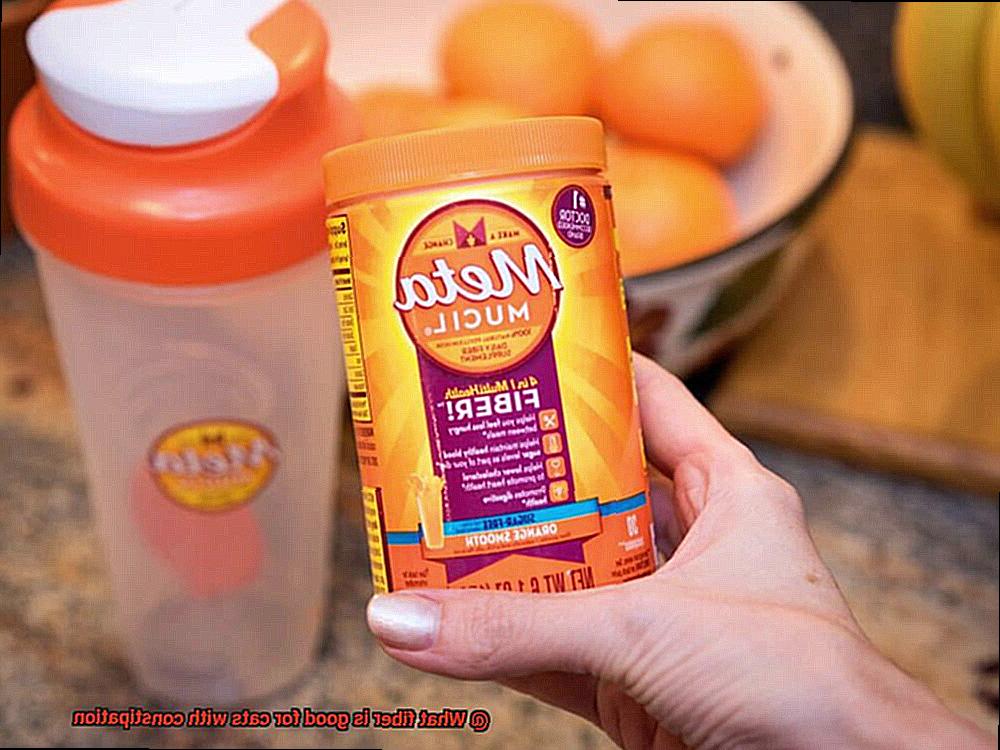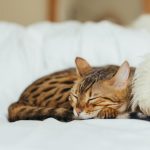Cats are notorious for being picky eaters, but when it comes to their digestive health, we need to make sure they’re getting all the nutrients they need. Unfortunately, constipation is a common issue that can cause discomfort and pain for our feline friends. As responsible pet owners, it’s up to us to find ways to help alleviate their discomfort – and one simple solution is increasing their fiber intake.
Fiber is an essential part of a cat’s diet as it helps stimulate bowel movements and keeps the digestive tract functioning properly. It also has other benefits like improving weight management, reducing inflammation, and preventing certain diseases. However, not all fibers are created equal, and some types can worsen your cat’s constipation.
So what type of fiber should you give your furry friend? In this article, we’ll explore the different types of fibers that are good for cats with constipation. We’ll also provide tips on how to incorporate them into your cat’s diet and discuss common causes of constipation in cats. So sit tight and get ready to learn more about how to keep your cat’s digestive system healthy and happy.
What is Insoluble Fiber?
Insoluble fiber is a crucial part of a healthy diet for cats, and it’s important to understand what it is and how it works. Unlike soluble fiber, insoluble fiber cannot be dissolved in water. Instead, it passes through the digestive system mostly unchanged, adding bulk to the stool and promoting regular bowel movements. This type of fiber can be found in whole grains, vegetables, and fruits with edible seeds and skins.
For cats struggling with constipation, insoluble fiber can be a helpful solution. It softens the stool and promotes bowel movements, making it easier for your feline friend to go potty. However, too much insoluble fiber can have the opposite effect and cause further constipation. That’s why it’s important to introduce it gradually into your cat’s diet and monitor their response.
Some good sources of insoluble fiber for cats include brown rice, oatmeal, pumpkin, and sweet potatoes. These foods can be added to your cat’s diet in small amounts as a supplement or mixed in with their regular food. Pumpkin is particularly beneficial because it also contains high levels of water which can help keep your cat hydrated.
It’s essential to remember that while insoluble fiber can be helpful in promoting regular bowel movements, it should not be relied upon as the sole solution for chronic constipation in cats. If your cat is experiencing ongoing issues with constipation, it is important to consult with a veterinarian to rule out any underlying health conditions and develop a comprehensive treatment plan.
To ensure that your cat is receiving the right amount of insoluble fiber in their diet, it’s important to introduce it gradually and monitor their response. Too much insoluble fiber can have the opposite effect and cause further constipation, so finding the right balance is key.
In addition to adding insoluble fiber to your cat’s diet, proper hydration and exercise are also crucial components of preventing constipation. Encouraging your cat to drink enough water and engage in regular physical activity can help keep their digestive system healthy and prevent constipation.
Benefits of Insoluble Fiber for Cats with Constipation
However, there’s a superhero that can come to the rescue – insoluble fiber. This type of fiber does not dissolve in water and remains intact during digestion. It is often recommended for cats with constipation as it helps to add bulk to their stool and promote regular bowel movements. But what are the specific benefits of insoluble fiber for cats with constipation? Let’s dive in.
Firstly, insoluble fiber helps to prevent blockages in the digestive tract. When your cat is constipated, their stool becomes hard and dry, making it difficult to pass through their intestines. This can potentially lead to blockages, which can cause discomfort and even more health issues. Insoluble fiber adds bulk to the stool, making it easier to pass through the digestive tract without causing blockages.
Secondly, insoluble fiber promotes overall digestive health in cats. Fiber stimulates the muscles in the intestines, which helps to keep things moving smoothly. This can prevent issues such as bloating, gas, and diarrhea. By promoting healthy digestion, insoluble fiber ensures that your cat’s digestive system is functioning optimally.
Another benefit of insoluble fiber is that it can help regulate blood sugar levels in cats. This is especially important for cats who may be at risk for diabetes or who already have the condition. By slowing down the absorption of sugar into the bloodstream, insoluble fiber can help prevent spikes in blood sugar levels and maintain a healthy balance. This ensures that your cat’s blood sugar levels remain stable and reduces the risk of diabetes-related complications.
So how can you incorporate insoluble fiber into your cat’s diet? It can be found in various foods such as fruits, vegetables, and grains. To ensure that your cat receives an adequate amount of insoluble fiber in their diet, consider adding foods such as green beans, broccoli, and brown rice. However, it’s important to consult with your veterinarian before making any changes to your cat’s diet or introducing new foods.
Types of Insoluble Fiber for Cats
One way to promote regular bowel movements and prevent constipation in cats is by incorporating insoluble fiber into their diet. Insoluble fiber is a type of fiber that cannot be digested by the digestive system, adding bulk to stool and making it easier to pass through the intestines. Here are some types of insoluble fiber that can benefit your cat:
Cellulose
Cats can benefit from cellulose, which is found in plant cells and provides structure to plants. Vegetables like kale, broccoli, and spinach, as well as fruits like apples and pears, are excellent sources of cellulose. This fiber helps absorb water and increase stool size, making it easier for your cat to pass stool.
Lignin
Lignin is another type of insoluble fiber that can benefit cats with constipation. It is found in plant cell walls and helps keep the digestive system healthy by adding bulk to stool and pushing waste through the intestines. You can find lignin in wheat bran, oat bran, and rice bran.
Whole grains
Whole grains like brown rice or oats are rich in insoluble fiber and provide additional nutrients that can support your cat’s overall health. These grains are particularly beneficial for cats with constipation as they help add bulk to stool.
Hemicellulose
Cats can also benefit from hemicellulose, a type of fiber that comes from plant cell walls and is found in grains like corn, wheat, and oats. This fiber helps promote regular bowel movements by adding bulk to stool.
Chitin
Finally, chitin is a type of insoluble fiber that comes from the shells of crustaceans like shrimp and crab. While not as commonly added to a cat’s diet, chitin can still provide benefits for their digestive health.
It’s important to note that introducing insoluble fiber into your cat’s diet should be done gradually. Abrupt changes in their diet can cause digestive upset or even diarrhea. Therefore, start with small portions and monitor your cat’s response before increasing their intake.
How to Feed Insoluble Fiber to Cats
Feeding insoluble fiber to cats can be a safe and effective way to improve their digestive health. Insoluble fiber is a type of fiber that does not dissolve in water and can help promote regular bowel movements in cats. Here are five tips for feeding insoluble fiber to cats safely and effectively.
Choose the Right Sources of Insoluble Fiber
When feeding your cat insoluble fiber, it’s important to choose the right sources. Good sources of insoluble fiber for cats include wheat bran, corn bran, psyllium husk, pumpkin, and sweet potato. You can boil or steam these sources and then mash or puree them before adding them to your cat’s diet.
Introduce It Slowly
To prevent digestive upset, it’s important to introduce insoluble fiber slowly into your cat’s diet. Start with a small amount and gradually increase the amount over time. You can mix a small amount of the fiber supplement into their wet food or sprinkle it over their dry food.
Provide Plenty of Fresh Water

Insoluble fiber absorbs water, so it’s important to provide plenty of fresh water for your cat to drink when consuming higher amounts of fiber. This will help prevent dehydration and keep your cat hydrated.
Monitor Their Response
Keep a close eye on your cat’s response to the added insoluble fiber. Too much fiber can have the opposite effect and lead to diarrhea. It’s recommended to consult with your veterinarian before adding any new supplements or dietary changes to your cat’s routine.
Consider High-Fiber Commercial Cat Foods
High-fiber commercial cat foods that contain insoluble fiber sources like corn bran, oat hulls, or cellulose can also help improve bowel regularity. However, not all cats may respond well to high-fiber diets, so it’s best to consult with a veterinarian before making any dietary changes.
High-Fiber Commercial Cat Foods for Constipation
Fortunately, there is a solution: high-fiber commercial cat food. These foods are specially formulated to provide the necessary fiber content that helps regulate bowel movements and prevent constipation in cats.
But not all fibers are created equal. When shopping for high-fiber cat food, it’s essential to check the ingredient list and choose a reputable brand that contains a healthy balance of soluble and insoluble fibers. Soluble fibers absorb water and form a gel-like substance in the intestine, while insoluble fibers add bulk to the stool and help move it through the digestive system.
Some popular high-fiber commercial cat foods include Hill’s Science Diet Adult Indoor Cat Dry Food, Blue Buffalo Indoor Health Chicken and Brown Rice Recipe, and Wellness Complete Health Natural Grain Free Wet Canned Cat Food. These brands contain a variety of fiber sources such as brown rice, oats, and fruits and vegetables like carrots and spinach.
However, it’s crucial to note that switching to a high-fiber diet should be done gradually over several days to prevent digestive upset. It’s always advisable to consult with a veterinarian before making any significant changes to your cat’s diet.
Other Solutions for Chronic Constipation in Cats
Although increasing fiber intake is a common solution, there are other effective ways to alleviate constipation in cats. Let’s explore some of these solutions in detail.
First and foremost, it’s crucial to ensure that your cat is drinking enough water. Dehydration can worsen constipation, so encouraging your cat to drink more water is key. Consider adding wet food to their diet or investing in a pet fountain that entices cats to drink more water by mimicking the sound and movement of flowing water.
Another solution is exercise. Cats that are more active tend to have healthier bowel movements. Play with your cat more often or provide them with toys that encourage movement and playfulness. Not only will this help with constipation, but it will also promote overall health and wellbeing.
Probiotics and digestive enzymes can be beneficial in promoting regular bowel movements by aiding in digestion and fostering healthy gut bacteria. Before introducing these supplements to your cat’s diet, consult with your veterinarian to ensure they are safe for your cat.
If your cat’s constipation persists despite trying the above solutions, it’s essential to seek advice from your veterinarian. They may recommend medication or a specialized diet tailored to address the issue. In some cases, an underlying health condition may be causing the constipation, so it’s vital to rule out any underlying issues.
Health Conditions that May Cause Constipation in Cats
If you notice that your cat is struggling to defecate or producing stools irregularly, it could be an indication of constipation. There are numerous health conditions that can cause constipation in cats, and it’s essential to understand these conditions to provide the best possible care for your pet.
One of the most common health conditions that can lead to constipation in cats is kidney disease. This condition can cause dehydration, resulting in hard, dry stools that are difficult to pass. In addition, hyperthyroidism and diabetes can also cause dehydration, leading to constipation in cats.
Inflammatory bowel disease (IBD) is another health condition that can lead to constipation in cats. IBD is caused by an abnormal immune response in the intestinal tract, which can cause inflammation and damage to the lining of the intestines. Cats suffering from IBD may experience chronic diarrhea, vomiting, and constipation.
Certain medications such as painkillers and antacids can also cause constipation in cats. These medications can slow down the digestive system, causing fecal matter to become hard and challenging to pass. If your cat is taking medication and experiencing constipation, it’s important to consult with your veterinarian about alternative treatment options.
If you suspect that your cat is suffering from constipation, it’s essential to consult with your veterinarian. Treating the underlying health problem can often alleviate the symptoms of constipation and improve your cat’s overall health. Alongside medical treatment, there are lifestyle changes you can make to help prevent constipation in your cat, such as encouraging them to drink more water and exercise regularly.
When to See a Vet for Cat Constipation
If you notice your cat struggling with constipation, it’s crucial to act promptly and seek veterinary care. Constipation in cats is a common problem caused by various factors, such as diet, dehydration, lack of exercise, and medical conditions. Here’s what you need to know about when to see a vet for cat constipation.
Firstly, it’s important to identify the signs of constipation in your cat. These may include straining during bowel movements, reduced appetite, lethargy, and vomiting. These symptoms can indicate that your cat is uncomfortable and in distress. If your cat is experiencing constipation for more than 2-3 days or shows any signs of discomfort or distress, it’s recommended to seek veterinary care.
Why is it important to see a veterinarian for your cat’s constipation? A veterinarian can perform a physical exam, palpate the abdomen, and possibly perform diagnostic tests such as blood work or imaging to determine the underlying cause of constipation. In some cases, constipation can be a symptom of more serious conditions such as megacolon or tumors that require prompt medical attention.
Moreover, a veterinarian can provide appropriate treatment options for your cat’s constipation. This may include laxatives, stool softeners, enemas or dietary changes. Your vet will work with you to determine the best course of action for your cat’s unique needs.
In addition to seeking veterinary care, there are also steps you can take to prevent and manage constipation in your cat. Ensure that your cat has access to clean water at all times and feed them a balanced diet with enough fiber. Regular exercise can also help prevent constipation.
rKRtXyrp1NU” >
Conclusion
As pet owners, we understand the importance of ensuring our feline friends are healthy and comfortable. Constipation can cause discomfort and pain for cats and it’s up to us to find ways to alleviate their symptoms. One simple solution is increasing their fiber intake. Fiber is essential for a cat’s diet as it helps stimulate bowel movements and keeps the digestive tract functioning properly.
When it comes to insoluble fiber sources, brown rice, oatmeal, pumpkin, and sweet potatoes are excellent options for cats with constipation. These foods can be added in small amounts as a supplement or mixed in with their regular food. However, it’s crucial to introduce insoluble fiber gradually into your cat’s diet and monitor their response.
In addition to adding insoluble fiber, proper hydration and exercise are also key components of preventing constipation in cats. Encouraging your cat to drink enough water and engage in regular physical activity can help keep their digestive system healthy.
If your furry friend continues to experience constipation issues despite these measures, consulting with a veterinarian is vital. They can rule out any underlying health conditions and develop a comprehensive treatment plan tailored specifically for your cat.


